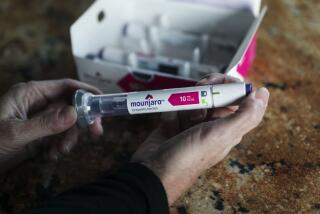A CLOSER LOOK: Type 2 diabetes medication
- Share via
Medications for Type 2 diabetes are very effective at controlling blood sugar levels. So you’d think the drugs would also be very effective at controlling complications of the disease: cardiovascular disease, kidney failure, blindness, nerve damage and amputation. Surprisingly, though, that has not turned out to be the case for cardiovascular events such as heart attacks and strokes.
Patients with Type 2 diabetes have heart disease rates two to four times normal, and two-thirds die from a heart disease-related event. The first real tipoff that diabetes drugs might not be lowering these risks came from a 10-year British study published in 1998.
It compared treatment with oral medications or insulin to dietary control supplemented with drugs only if blood glucose climbed past a certain point. The more intensive treatments helped keep blood sugar in check and reduced the risk of side effects on eyes, kidneys and nerves -- but not the heart.
In June 2008 results from two much larger U.S. studies were published in the New England Journal of Medicine. One treated 10,251 patients in either a standard fashion (oral drugs and often insulin to get blood glucose levels down to an average of 155 mg/dL to 180 mg/dL); or intensively (to achieve even lower levels, below 125 mg/dL). The trial was stopped early because there were more deaths from any cause and more cardiovascular-related deaths in the intensive group than in the standard group.
This suggests that working harder to lower blood glucose in Type 2 diabetes doesn’t reduce risk for heart disease and may in fact bring harm.
The other study, also tested intensive therapy against standard therapy and found neither benefit nor harm to the heart with intensive therapy.
Dr. William Duckworth, who directs diabetes research at the Carl T. Hayden VA Medical Center in Phoenix, doesn’t think that the drugs are raising the risk -- just that they’re not very good at lowering it. He says his own research suggests that intensive glucose control is effective against cardiovascular risks if it is started early after a diabetes diagnosis.
But Dr. Victor Montori, a physician-researcher at the Mayo Clinic in Rochester, Minn., thinks that tight glucose control may be getting too much emphasis in diabetes management. In an April paper, he advocated “good enough” glucose control instead. This would include weighing the benefits of sugar control against some of the undesirable effects of diabetes medications, such as weight gain and hypoglycemia.
It would also ease the time and energy it takes to manage diabetes -- as much as 143 minutes per day, by one estimate, if patients do everything they’re told to. “That’s as much as a part-time job,” Montori says.
--






